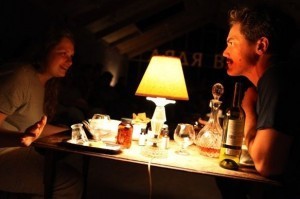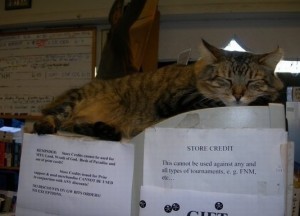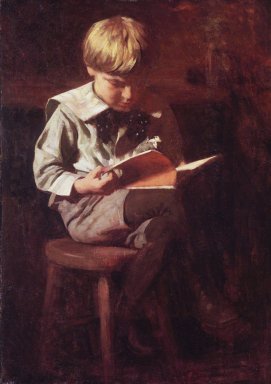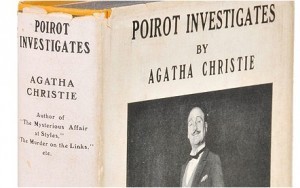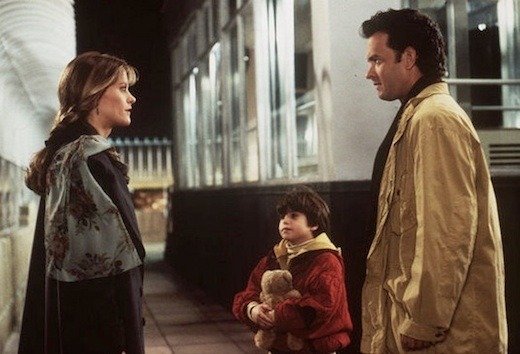The Paris Review's Blog, page 903
July 3, 2012
On Uncle Vanya: Part Two
But how I got to thinking about my drunken love affair, years ago in Saint Petersburg, is Sam Gold’s new production of Chekhov’s Uncle Vanya, playing now at the Soho Rep.
It’s ninety-nine-cent Sunday, and the line of sweaty New Yorkers edging for shade outside the eighty-seat theater is long. They are bored and tired. It’s a muggy ninety degrees. “We’re never going to get in,” I hear one complain to another; later, outside the bathroom, where they sell vodka shots for three dollars a piece, I hear an excited woman say to her date: “I can’t believe we made it!” Most of the people who stood or sat in line (many since two P.M.) did not see the show. My own guests, who had driven in from the Bronx for the production, were turned away.
“I’m the reviewer,” I tried to convince the guy at the door.
“Man, we don’t get lines like this, even for the Sunday show. I’ll have a revolt. It wouldn’t be fair.”
My friends went to see a movie, and my date and I went to our corner seats, right by the couch where the Professor would later be shot (and not).
Rap, Poetry, and Cats
The London Olympics may be a couple of weeks away, but the poetry Olympics have already begun.
Science-based art.
The Elements of Style, as rap video.
An appreciation of illustrator R.O. Blechman.
Bookstore cats across America.
July 2, 2012
Size
I am the first one in Stockholm’s Centralbadet this Monday morning, followed by James, then by an old man wearing big yellow goggles, who does a steady breaststroke around the perimeter of the pool. Watching him, I switch to breaststroke myself and match his speed. It feels comfortable. It feels relaxing. As the three of us swim counterclockwise, I channel my old age, my flabby form, my unself-conscious senior. I think of the two older women I passed in the locker room, whose modest black tanks encased humps and bones and bumpy flesh. The cruel phrase a friend once used to describe a woman’s backside: “a bagful of doorknobs.” I watch my hands trace their double ellipse in front of me, my mother’s wrists, my grandmother’s knuckles.
On Uncle Vanya: Part One
 I was in Saint Petersburg, at a restaurant owned by a friend. It was in a strange building, a kind of old mansion. He took me back through several empty ballrooms—you could feel the springs beneath the wooden floors, installed many years ago, for dancing. We sat together in a small room. It had only two tables, and its windows were hung with heavy curtains. It was one of those private dining rooms that you read about in Russian novels, and my friend began to bring me different dishes. I recognized only the blini with black and red caviar; everything else was new to me. At this time, thirteen years ago, I was a wine drinker, but they did not have wine worth drinking in Saint Petersburg then, and he was pouring me glasses of vodka. Then several government officials arrived, important men, and he left me alone.
I was in Saint Petersburg, at a restaurant owned by a friend. It was in a strange building, a kind of old mansion. He took me back through several empty ballrooms—you could feel the springs beneath the wooden floors, installed many years ago, for dancing. We sat together in a small room. It had only two tables, and its windows were hung with heavy curtains. It was one of those private dining rooms that you read about in Russian novels, and my friend began to bring me different dishes. I recognized only the blini with black and red caviar; everything else was new to me. At this time, thirteen years ago, I was a wine drinker, but they did not have wine worth drinking in Saint Petersburg then, and he was pouring me glasses of vodka. Then several government officials arrived, important men, and he left me alone.
I noticed my waitress was beautiful. She was taller than me, with high aristocratic cheekbones, pale skin, lips full of blood, big firm tits. Very much the woman you want, if you want a Russian beauty. The type that has since made exported Russian prostitutes famous throughout Europe, the Middle East, and (lately) even large cities in the U.S.
I was determined to have sex with a Russian whom I did not have to pay.
Read More »
Books, Crime, and Punishment!
Master book thief Anders Burius stole the 1597 Wytfliet Atlas a decade ago; now, it has turned up in New York, and will be returned to the Swedish Royal Library.
A New Mexico woman was jailed for failing to return a copy of Twilight to the library. (Charges have since been dropped.)
An Argentinian independent publisher Eterna Cadencia adds an element of urgency to reading, by publishing books in disappearing ink.
A lawyer requests time off from a murder trial to attend the famed Key West Hemingway Lookalike Contest. And is denied.
A handy chart helps you choose your beach read.
June 29, 2012
How Do I Break My Trash Addiction?
Dear Paris Review,
For the last few months I have been rotting my brain with nothing but trash. (I am ashamed to admit how trashy, but let’s just say a certain mommy-porn trilogy may have been involved.) And the worst part is, now I find myself unable to read anything good. How do I transition back to respectable books? Sincerely, Trashy
Dear T.,
I think this has happened to a lot of us, in one form or another. I’ve also had a variation on this experience with movies: the Ozus and Bergmanns in my Netflix queue mock me as I sheepishly skip over them, yet again, in favor of season 2 of The Borgias or some competitive-cooking show that forces people to re-create a taste memory using one hand, a Bunsen burner, and a palm frond. Sometimes we need transitional fare, the literary equivalent of a basically formulaic romantic comedy with a low budget and indie pretensions, if you will.
The good news is, there is no shortage of reads that are every bit as fun as what you term trash, but won’t leave you feeling like you just wasted six hours of your life. Lorin gave a good rundown not long ago. To his list I’d add classics like The Secret History, Case Histories, The Handmaid’s Tale, and Bonjour Tristesse, and newer titles Skippy Dies, The Chaperone, and Ghost Lights. If you like thrillers, there’s no shortage. I enjoy Tana French, although she’s not everyone’s idea of a beach read. If you’re really having a tough time weaning yourself, maybe try a different genre entirely: humorous essays always go down easy, and, along the same lines, short-story collections provide a gradual transition. Personally, I’m a sucker for a juicy biography: The Sisters, American Gothic, and Savage Beauty all got me through periods of intellectual exhaustion. Good luck, and I look forward to more suggestions from our readers!
Have a question for the editors of The Paris Review? E-mail us.
What We’re Loving: Giant Dollhouses, Literary Art, Sade
Literature is trending in the New York art world right now. One show in Chelsea takes its cue from William Blake’s Songs of Innocence and Experience, and another borrows its title and raison d’être from Henry Miller’s “Stand Still Like a Hummingbird.” In the latter show, at David Zwirner, a work by Mason Williams from 1967 consists of a life-size silkscreen print of a Greyhound bus that can either be hung on the wall as a mural or folded and placed in a box. It seems, to me, to be analogous to much of literature—a picture of the larger world that is neatly held within an object whose diminutive size belies the limitless scope within it. The work weights more than ten pounds, which means it’s still heavier than a six-pack of Proust or a hardcover Larousse Gastronomique. —Nicole Rudick
This week, I revisited Richard Rodriguez’s memoir, Brown: The Last Discovery of America, and found that it’s as relevant today as it was when it was first published in 2002. Rodriguez explores the problem of being read primarily through his racial and sexual identity. He argues that the belief that only your demographic doppelgänger can address or portray you is counter to the function of literature, which allows moments of recognition between two very particular—and therefore different—lives. “Auden has a line,” he writes. “Ports have names they call the sea. Just so, literature will describe life familiarly, regionally, in terms it is accustomed to use […],” but ultimately, has “only one subject: What it feels like to be alive.” Rodriguez’s politics, when you agree with them and especially when you don’t, are stimulating and certainly worth the patient reading they demand. —Alyssa Loh
There are a few things I love so dearly that finding out someone doesn’t like them can make it instantly very difficult for me to relate to that person. “By Your Side” by Sade is one of them. The song has magical soothing powers. It’s a bit like being inside during a summer storm, wrapped in a blanket and watching rain graze the windowpane. (You probably shouldn’t tell me if you don’t like it.) —Anna Hadfield
Even though Thessaly recommended Leanne Shapton's Swimming Studies last week, I have to pile on! I've rarely been so wholly consumed by a reading experience. Shapton’s vivid description of a moment during a swim practice brought me back to my own high school pool on one of hundreds of winter nights: the soupy chorine-thick smell, the familiar feeling of sweating while in water, and the refreshing wave of winter cold hitting me as I made a flip turn at the far end of the pool. I dog-eared the passage; by the end I had folded down more page corners than were left unturned. In evocatively describing things like sliding around in sheets after shaving your entire body or the ability to know one’s status by the type of goggles, Swimming Studies brings the solitary activity of swimming into everyday life. It isn’t a sports book; in Swimming Studies the author has created a place for athlete and artist to coexist. —Emily Cole-Kelly
Several friends who know me well sent me this photo gallery, and they were right on the money: I’m enraptured by Canadian artist Heather Benning’s conversion of an abandoned farmhouse into a giant, open-sided dollhouse. —Sadie Stein
Fake Books, Real Books, and YA Austen
A first edition of Agatha Christie’s Poirot Investigates, complete with dust jacket, has sold at auction for a record £40,630.
The Hairpin redesigns the book club.
The classics, repackaged for teens. “We didn’t want to go with a muted approach,” understates the publisher.
New Yorkers! Help save village institution Revolution Books.
Angelenos! A star-studded Bukowski tribute.
Fake books from movies that Flavorwire wishes were real.
June 28, 2012
Nora Ephron’s Potato-Chip Legacy
In April The Believer declared Nora Ephron “the original Tina Fey.” This week, an obituary on The Daily Beast said that she was bigger than Twain. Both superlatives gloss over the fact that Ephron’s work was widely reviled (a Village Voice review of Bewitched even argued that “the Ephrons should have to sharecrop, for all the good they've done for the culture”) and that, even for Ephron devotees, part of the charm of seeing her latest flick was wondering whether it’d be typical Burbank dung (Mixed Nuts! Michael!) or a piece of deathless Hollywood legend.
Ephron kept dice in her purse, was willing to “teach almost anyone how to play craps at a moment’s notice,” and her writing had a gambler’s unevenness. The rambling digressiveness, along with the faint datedness, of her worldview only intensified your shock when Ephron arrived, seemingly by accident, at an incisive thought. Here she is in her 1983 roman à clef Heartburn, recounting a speech she often made while preparing Lillian Hellman’s pot roast recipe:
I have no problem with her political persona, or with her insistence on making herself the centerpiece of most of the historical conflicts of the twentieth century; but it seems to me that she invented a romantic fantasy about her involvement with Dashiell Hammett that is every bit as unrealistic as the Doris Day movies feminists prefer to blame for society’s unrealistic notions about romance … it occurred to me as I delivered [the speech] yet another time that I had always zipped through that part of the speech as if I had somehow managed to be invulnerable to the fantasy, as if I had somehow managed to escape from or rise above it simply as a result of having figured it out. I think you often have that sense when you write—that if you can spot something in yourself and set it down on paper, you’re free of it.
As someone who was corn-fed on her movies as a child, the passage seems eerily prophetic. Seeing Ephron gab about “unrealistic notions about romance” in 1983 is rather like hearing those reports that the young L. Ron Hubbard told friends, “If you want to get rich, you start a religion”—and it hints at the nagging contradictions of Nora Ephron’s life.
This Side of Paradise
Howard Finster was fixing a bicycle in his Summerville, Georgia, workshop one day when a smudge of paint on his index finger took the shape of a face, a face that spoke to him and told him, “Paint sacred art.” Finster, then in his sixties, had been many things in his life: a teenage tent-revival preacher, a pastor, a mill worker. He had never been an artist, but he had also never been a man to shirk the word of God.
That was in 1976. The Lord told him to make five thousand works, a quota he reached just before Christmas 1985. By the time he died in 2001, his catalogue had swelled to more than forty-six thousand pieces. He devised an intricate numbering system and timestamped many of his works upon completion; he often painted through the night, sleeping only intermittently. Sometimes he signed his paintings BY HOWARD FINSTER, OF GOD. MAN OF VISIONS.
The Paris Review's Blog
- The Paris Review's profile
- 305 followers


